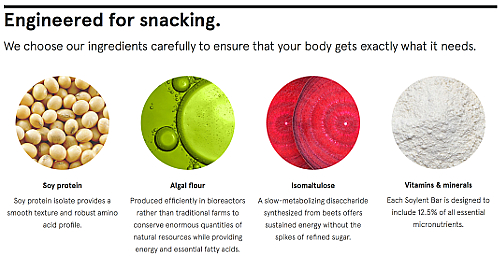When the recall alert for Soylent brand “Food Bars” hit my email a couple of days ago I would have thought it was a colleague pulling my leg but for the standard coding and language from the Canadian Food Inspection Agency.
 The thought of the name Soylent applied to an “engineered food” designed to “expand access to quality nutrition through food system innovation” and “produced efficiently in bioreactors, rather than on farmland” gave me a giggle. It reminded me of what I consider to be Charlton Heston and Edward G. Robinson’s best movie.
The thought of the name Soylent applied to an “engineered food” designed to “expand access to quality nutrition through food system innovation” and “produced efficiently in bioreactors, rather than on farmland” gave me a giggle. It reminded me of what I consider to be Charlton Heston and Edward G. Robinson’s best movie.
Thanks, by the way to our readers who piped up in the comment thread on the story with their tongues in their cheeks. After I had my giggle at the product’s name — and then a guffaw when I checked out the company’s descriptions of its products — I realized my amusement was probably a reflection of my advancing age.
I had heard of the meal replacement powders and beverages sold under the Soylent brand before Friday, but the mental image of a Soylent “Food Bar” was a whole different picture.
The 1973 motion picture “Soylent Green,” which featured Robinson in a death scene to die for, has an intriguing sub-plot question that was teased to perfection by the film’s title. Everyone in the over-populated, futuristic flic wanted to know what made Soylent Green so much more flavorful than Soylent Red or Soylent Yellow. Spoiler Alert: Soylent Green is people.
For some reason that four-word revelation is among a handful of movie lines that have transcended most of the newsrooms I’ve frequented. At any moment in time, five minutes or five hours from deadline, someone will just announce to the newsroom at large: “Soylent Green is people.”
I’ve no idea why so many print journalists I’ve worked with enjoy that line. Similarly, I couldn’t imagine why anyone would name any food product “Soylent” unless it was designed to be served by vendors at Star Trek conventions.
 Then I visited the Soylent website that describes the products, mission and vision of four young men who co-founded Rosa Foods Inc., which produces the Soylent line. They explain their mission: “Expand access to quality nutrition through food system innovation” and suggest “While not intended to replace every meal, Soylent can replace any meal.”
Then I visited the Soylent website that describes the products, mission and vision of four young men who co-founded Rosa Foods Inc., which produces the Soylent line. They explain their mission: “Expand access to quality nutrition through food system innovation” and suggest “While not intended to replace every meal, Soylent can replace any meal.”
They haven’t been able to explain why dozens of consumers have been posting comments — since the Soylent Food Bars started shipping the first week of September — detailing how they’ve been plagued by gastro reactions including vomiting and diarrhea.
Many of those customers profess their loyalty to Soylent powders and beverages after they describe classic food poisoning symptoms that developed after they tried the much anticipated Soylent Food Bars.
Kudos to Rosa Foods Inc. of Los Angeles for stopping distribution and eventually recalling the Soylent Food Bars until they figure out what’s up. And kudos to them for crediting their brand name to Harry Harrison’s 1966 science fiction novel “Make Room! Make Room!” that served as the loose basis for “Soylent Green.”
(To sign up for a free subscription to Food Safety News, click here.)
